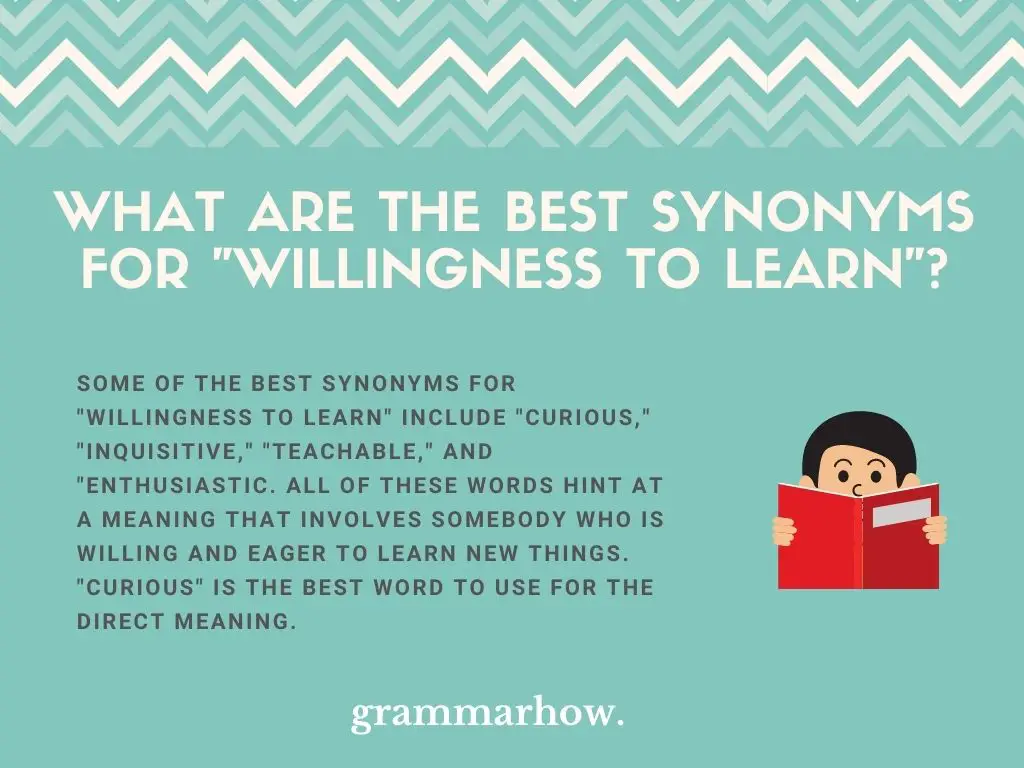Finding the correct word for eager to learn doesn’t have to be a challenge. It’s great to expand your vocabulary and broaden your knowledge if you can put a word to a description. In this article, we’ll look at good words for a willingness to learn and how to use them.
What Are The Best Synonyms For “Willingness To learn”?
Some of the best synonyms for “willingness to learn” include “curious,” “inquisitive,” “teachable,” and “enthusiastic. All of these words hint at a meaning that involves somebody who is willing and eager to learn new things. “Curious” is the best word to use for the direct meaning.
According to The Cambridge Dictionary, the definition of “curious” is “interested in learning about people or things around you.”
So, in this article, we’ll look at the following words and how they relate to the phrase “willingness to learn:”
- Curious
- Inquisitive
- Teachable
- Enthusiastic
Curious
“Curious” is by far the most compatible word with the meaning we’re looking for. You can use it to mean precisely that somebody is willing to learn about something.
Someone that is “curious” is interested in learning new things. Those things can be about people or things, and the curious person is always interested to find out more.
For the most part, “curious” is a positive adjective we can use to describe somebody who is willing to learn new things. It’s a great way to use a quick and easy word to convey your meaning.
- I’m curious about history, so I asked my teacher for more textbooks.
- He was curious about what was inside the cave and found some amazing things.
- My children have always been curious souls. They’re constantly finding new things to entertain themselves with.
- You’re a curious being, aren’t you!
As you can see, “curious” is a great word to use when talking about somebody who is willing to learn all about new things. You’ll usually use it in a positive way, though that isn’t always the case.
Sometimes, “curious” is used as a negative adjective. That means that people might call someone “curious” who’s a little too eager to learn about new things. While it’s usually good to be happy to learn about things, some people go overboard and put themselves in danger to learn.
You may have heard the old idiom:
- Curiosity killed the cat.
It’s this idea that sometimes lets “curious” be painted in a negative light.
Inquisitive
Next, we want to talk you through “inquisitive.” It’s another great synonym to use and is definitely up there with “curious.” Many people like to use “inquisitive” as a way to talk about somebody who is willing to learn.
“Inquisitive” means that somebody wants to discover and explore new possibilities. They always have a thirst to try new things and won’t rest until they’ve satisfied that thirst.
According to The Cambridge Dictionary, the definition of “inquisitive” is “wanting to discover as much as you can about things.”
Just like “curious,” “inquisitive” comes with both positive and negative connotations. For the most part, it’s a very positive adjective that you can use to describe somebody who is willing to learn all kinds of new things about the world and the people around them.
- I like to be inquisitive about new things and don’t stop learning until I’ve mastered them (which will never happen)!
- He’s so inquisitive about things. You honestly will never beat him at a strategy game.
- You’re the most inquisitive person I’ve ever met. You’ll find a way to appeal to the masses.
- He’s far too inquisitive to be kept here at the office! You need a grander job that appeals to your capabilities.
“Inquisitive” is a great word to use to talk about somebody who is willing to learn. Usually, “inquisitive” people are slightly more impressive than “curious” people because they often have a tactical thought process or are capable of more critical thinking skills.
Generally, “inquisitive” people are also “intelligent” people, while “curious” people might simply be interested in learning new things.
However, “inquisitive” can also be used negatively. You might find yourself calling someone “too inquisitive” when their eagerness to learn about new things annoys you.
In fact, The Cambridge Dictionary definition in full looks like this:
- wanting to discover as much as you can about things, sometimes in a way that annoys people
Teachable
“Teachable” is another great word to use as a replacement to “willingness to learn.”
“Teachable” is used as an adjective to mean that somebody is capable of being taught new things. It usually implies that they’re willing to learn all about new things, making them an easy candidate to teach.
According to The Cambridge Dictionary, the definition of “teachable” is “able to be taught; that can be taught.”
Most of teaching works better when the people you’re teaching are receptive to what you’re saying. If they’re intent on listening and learning, then someone will have a much better time learning from you. It’s these teachable people that make it worthwhile to be a teacher.
- He’s such a teachable student; I couldn’t ask for someone better!
- You’re so teachable. I always have fun studying and teaching with you.
- My teacher said I’m a teachable pupil.
Enthusiastic
Finally, let’s look at “enthusiastic.” This is a great synonym to use, but it doesn’t always relate to a willingness to learn. Enthusiasm can extend to a wide variety of things in life.
“Enthusiastic” means that somebody is eager to do new things. It doesn’t always have to be learning. You can be enthusiastic about a new hobby or a new sport.
According to The Cambridge Dictionary, the definition of “enthusiastic” is “showing enthusiasm.” This means that someone is eager to learn all about new things.
- I’m an enthusiastic person when I’m introduced to new ideas.
- They’re so enthusiastic, and I can’t believe how happy they are to learn about such a boring subject!
- You’re so enthusiastic about school all the time!
While it doesn’t strictly refer to a willingness to learn, it can still be used correctly in that context. That makes it an excellent candidate to use as a synonym.
Martin holds a Master’s degree in Finance and International Business. He has six years of experience in professional communication with clients, executives, and colleagues. Furthermore, he has teaching experience from Aarhus University. Martin has been featured as an expert in communication and teaching on Forbes and Shopify. Read more about Martin here.
What adjective (single word) means ‘having/using a willingness to learn’?
asked Jan 5, 2015 at 16:26
UKBUKB
1211 gold badge1 silver badge5 bronze badges
1
I understand you’re looking for a single adjective, and I think «curious» fits the bill nicely (and from a pedagogical perspective curiosity is a key indicator of learner success) but I would like to add the following to the mix because I think it shows, if not willingness, at least readiness or capability, and it might be worth something to you:
fertile mind
From Collins:
fertile mind: One that is capable of sustaining, supporting, growing and developing mental thought interjection, especially among the very young.
answered Jan 5, 2015 at 16:54
Rusty TubaRusty Tuba
5,90514 gold badges36 silver badges55 bronze badges
How about curious?
- having a desire to learn or know more about something or someone
- marked by desire to investigate and learn
- eager to learn or know; inquisitive.
Or inquisitive ^
answered Jan 5, 2015 at 16:37
EFrogEFrog
6073 silver badges8 bronze badges
Having a willingness and capacity to learn is teachability:
teachable adj.
Capable of being taught: teachable skills.
Able and willing to learn: teachable youngsters.
teach′a·bil′i·ty, teach′a·ble·ness n. teach′a·bly adv.
American Heritage® Dictionary of the English Language, Fifth Edition.
Copyright © 2011 by Houghton Mifflin Harcourt Publishing Company.
Published by Houghton Mifflin Harcourt Publishing Company. All rights
reserved.
answered Jan 5, 2015 at 18:01
Edwin AshworthEdwin Ashworth
74.4k11 gold badges138 silver badges235 bronze badges
Three excellent non-idiomatic words have already been suggested, curious, inquisitive, and teachable, but my intuition is that English lacks a word with your precise definition.
I believe that the idiom «thirst» is what you are seeking. «Thirst for knowledge» is a borderline cliche, but it is still evocative and clear, and I think many people would define it as a «willingness (or desire) to learn». (For the close connection between «will» and desire» see the interesting discussion, “Make of that what you will” – meaning of “will”.)
answered Jan 5, 2015 at 23:08
hunterhoganhunterhogan
2,2459 silver badges23 bronze badges
There isn’t a single word in English that would fit. Generally, «eager to learn» would be used.
answered Jan 5, 2015 at 16:27
«Enthusiastic» is the best word that comes to mind for me. Doing is sort of like learning, so it is similar enough.
macraf
2,7209 gold badges25 silver badges36 bronze badges
answered Jan 5, 2015 at 21:03
kns98kns98
3801 silver badge5 bronze badges
Asked by: Prof. Maureen Williamson
Score: 4.8/5
(5 votes)
How to show you’re willing to learn in an interview
- Ask plenty of questions. …
- Demonstrate your passion for gaining new skills. …
- Earn certifications and take additional courses. …
- Request information about training and growth opportunities. …
- Pitch new ideas based on your research. …
- Remain updated on technological advancements.
How do you say willing to learn new things?
How to demonstrate a willingness to learn on a resume
- Highlight both hard and soft skills. …
- List additional certifications and credentials. …
- Describe the results of learning new skills. …
- Provide specific examples of your accomplishments. …
- Give examples of your professional development.
How do you write that you are willing to learn?
For example: Before: I may not have all the experience you would prefer, but I believe that my enthusiasm and willingness to learn make me a strong candidate. Better: I believe that my enthusiasm and willingness to learn make me a strong candidate. Use strong, active verbs — avoid the passive voice.
How can I learn more willing?
Here are 13 ways you can naturally increase your eagerness to learn and keep feeding your curiosity to stay focused on your learning goals.
- Show Your Eagerness. …
- Stay Updated. …
- Don’t Stop Developing Your Skills. …
- Look for Challenges. …
- Learn Lateral Thinking. …
- Be Open to New Experiences. …
- Start to Be Interesting.
What is an example of willingness to learn?
Examples: “I am keen to learn more about marketing research and the technologies required to do it”, “I have always been interested in business analysis issues and with a job in this field I want to improve my knowledge and my skills in this sector.” Show enthusiasm.
20 related questions found
How do I get a job without training?
Use these techniques to learn new responsibilities quickly even without training, or use them in parallel with existing training to maximize your effectiveness.
- Learn a New Job Quickly with the Pareto Principle.
- Learn Process Flow Concepts Separate From Procedures.
- Use Experienced Coworkers as Training Resources.
How do you describe someone who is willing to learn?
eager to learn or know; inquisitive.
Is willingness to learn a skill?
Willingness to learn is a key behaviour that helps us get on in life, whether personally or professionally. Simply put, it’s being open to – or seeking out – new experiences, skills and information that improve our abilities and enjoyment.
What are your strengths?
In general, your strengths should be skills that can be supported through experience. For example, if you list communication as a strength, you may want to recall a situation in which you used communication to reach a goal or resolve a problem.
What are your weaknesses?
Examples of weaknesses on the job
- Inexperience with specific software or a non-essential skill.
- Tendency to take on too much responsibility.
- Nervousness about public speaking.
- Hesitancy about delegating tasks.
- Discomfort taking big risks.
- Impatience with bureaucracies.
How do I learn new things professionally?
Highlight words: rewarding, productive, gainful, challenging, stimulating, develop, improve, acquire, hone, ambitious, eager, inquisitive, enthusiastic. In almost every career field you will find K.S. A’s- Knowledge, Skills, and Abilities. Always use these keywords to help build your statement on.
What are your skills?
What are my skills?
- Time management.
- Taking initiative.
- Resourceful.
- Creative.
- Problem solving.
- Building relationships.
- Verbal communication.
- Developing a plan.
Why should we hire you with no experience?
Why should we hire you? Make your lack of experience work in your favour. Use this as a strength and tell the panel you are fresh, enthusiastic, hungry and ready to get started! You want the panel to hire you because of your passion for this job and how much you are attracted to their company.
What is a word for willing to try new things?
To be adventurous is to be willing to try new things (not necessarily action-packed). Uninhibited often is used in the sense you ask for. Near-synonyms include unrestrained, unchecked, uncontrolled, unfettered, free, unbound, unconstrained, wild or unruly, unbridled, boundless, limitless, unstultified.
What is the word for willing to learn?
eager to learn or know; inquisitive.
How can I learn a new job quickly?
The first week of a new job
- Introduce yourself, relentlessly. …
- Ask well-timed questions. …
- Seek out a friend. …
- Learn how to navigate and enjoy your new workplace. …
- Get to know your team better. …
- Get organized and set good habits. …
- Define success with your manager. …
- Challenge yourself.
How do see yourself in 5 years?
How to answer ‘where do you see yourself in five years?’ in an interview
- Get clear about your career goals. Take some time to brainstorm what your career goals are for the next five years. …
- Find connections between your goals and the job description. …
- Ask yourself if the company can prepare you for your career goals.
What are career goals?
Career goals are targets. Things, positions, situations related to your professional life that you have set your mind on achieving. They can be short-term, like getting a promotion or certification, or they can be long-term, like running your own successful business or being an executive at your dream company.
What is your weakness best answer?
How to answer What are your greatest weaknesses? Choose a weakness that will not prevent you from succeeding in the role. Be honest and choose a real weakness. Provide an example of how you’ve worked to improve upon your weakness or learn a new skill to combat the issue.
Can you put self taught on resume?
Where to put self-taught skills on a resume? Self-taught skills can be placed in the ‘Education’ section. They can also be placed in the ‘Skills’ section if you would like to just list them. Put them in the ‘Work Experience’ section if you want to give details of professional goals achieved using these skills.
Is quick learner a skill on resume?
A fast learner is someone who embodies the skills of being a strategic thinker and a good listener and applies them to learning quickly. … Being a fast learner is a broad skill category that includes many hard skills that may be valuable for your resume in the following areas: Communication.
Why is it important to learn new things at work?
Learning helps you become more open to change. By developing a growth mindset and believing you can learn new things you will be more adaptable to the changes happening in your profession and workplace and you will be more willing to take on new ways of working.
What do you call someone who is willing to?
amenable. adjective. willing to do something or to agree with someone.
What do you call someone who likes trying new things?
You might consider neophile or neophiliac. The OED defines neophilia as: neophilia /niːəˈfɪlɪə/. Love for, or great interest in, what is new; a love of novelty. So neoˈphiliac, a person characterized by neophilia; also neoˈphili(a)c a.; neˈophily.
Maybe you’re entering the workforce for the first time and you don’t have much experience or skills under your belt. Or, perhaps you’re looking to dive into a new field of work mid-career. Maybe your industry is rapidly changing, necessitating that you learn new skills or technologies all the time. Whatever the reason, you’re short on the skills needed for the job you want. How can you let your future employer know that you’re willing to learn new skills and be trained?
Don’t worry, there are a number of ways you can do this. Check out the resume writing tips below and choose the one that best fits your circumstances.

Photo, J. Kelly Brito.
Why Willingness to Learn Looks Good on Your Resume
In industries that involve rapidly changing technologies——for instance, medicine or computer programming——employees must be agile and willing to adapt. They must constantly learn new skills in order to keep up with the competition. That willingness is a vital quality.
Even in other fields, willingness to learn is a good thing. For example, a construction foreman may look for employees that are willing to learn the company’s preferred methods, rather than being stuck on the ways they’ve worked in other circumstances.
Some job listings may even include willingness to learn as a requirement.
Additionally, a willingness to learn can be a plus when you are first entering the workforce. Hiring managers don’t expect entry-level employees to have all the skills and experience they’ll need to get the job done. But they do want someone who is attentive and ready to learn.

Photo, Krzysztof Maksimiuk.
Sometimes, you may want to say it outright. At other times, you can demonstrate your willingness to learn through your experiences or descriptions. Find out the best ways to say that you’re willing to learn on your resume.
Use a Resume Summary
You can use a direct approach by stating your willingness to be trained in the resume summary. The resume summary is located at the top of your resume, below your contact information and above your work experience and education.
If your experience and education aren’t a perfect match for the job, you can be forthcoming about it in the resume summary. You’ll also want to highlight your strengths, including your willingness to learn.
Your resume summary might read something like this:
A self-motivated [previous job title] who is willing to learn new techniques and best practices in order to keep [company’s name] operating ahead of the competition.
Check out this article for more information on how to write your resume summary.
This is also important if you are a student entering the workforce for the first time. We’ll discuss student resumes in more detail below.

Photo, Daria Nepriakhina.
Use a Skills Summary
A skills summary is like an expanded skills list that includes descriptions. You can use the description space to highlight how you’ve used a growing skillset in your career. For example, if you’re a computer programmer, you can talk about software and hardware. If you’re a doctor, discuss innovating techniques. Both of these show that you continue learning without saying so outright.
Include Certifications or Continuing Education
When you list certifications or other credentials on your resume, it shows that you were willing to learn the necessary skills to gain them; after all, most certifications require testing to prove you know the subject. The same is true of continuing education. Employers realise that much of this education comes at the expense of your own personal time, proving real self-motivation and a love of learning.
Use Synonym Keywords
You can also say you are willing to learn without using the words “willing to learn.”
Consider using some of the following keywords in your resume:
– Coachable
– Training
– Innovation
– Mentor/mentorship
– Motivated
– New skills
– Challenges
– Development experiences
– Self-taught

Photo, Adolfo Félix.
Describe Past Accomplishments and Results
In your job descriptions, try to highlight instances when you demonstrated a willingness to learn. For example, would any of the following apply to you?
– Monitored arts and culture news to keep pace with current design trends.
– Pioneered the use of [cite technique, software, or technology].
– Mentored by [cite well-known company or individual]
– Attended [cite industry conference] and thereafter applied [site new skill or technique] to [cite result].
Highlight Academic Accomplishment
If you are a student or recent graduate, you can highlight your academic or even extracurricular pursuits on your resume. Good grades, foreign languages, or other learning-focused endeavours will openly demonstrate your willingness to learn.
In Conclusion
A willingness to learn is a soft skill that is valuable in almost every field of employment. In rare instances, you may state your willingness to learn outright. In others, you can use examples of personal career development, continuing education, or the results of learning new skills to demonstrate your willingness without using the words “willing to learn.”
Furthermore, you can use resume templates to highlight your skills, input information in a readily-made document instead of creating it from scratch and organising the data into sections. Such a template is a great alternative when you don’t want to spend hours creating the resume by yourself or pay someone to do it for you.
Cooperation in that sense means sharing information and
Сотрудничество в этой области означает обмен информацией и
Для осуществления процесса обучения требуется пространство для маневра в политике, и НРС должны быть готовы учиться у других стран.
Такое впечатление, что ради туриста они готовы выучить любой язык мира.
It was willing to learn from the good practices of other treaty bodies and
to
share its own positive experiences.
Он готов учиться на передовом опыте других договорных органов и делиться своим положительным опытом.
keep reading the following review
to
find out.
В случае, если вы готовы, чтобы узнать больше информации об этой торговой платформе,
продолжайте читать следующий обзор,
чтобы узнать.
Но я хочу научиться и делать это, не чувствуя вины, если я что-то сделаю неправильно.
He
is
not convinced that the public would be willing to learn more about the Legacy of the ICTY and its work.
Он не убежден, что общественность пожелает узнать больше о наследии МТБЮ и результатах его деятельности.
It
is
likely that partners feel increased ownership and are willing to learn from an evaluation when they form an active part of it.
Grants
are
awarded on a competitive basis
to
talented youngsters who have
Гранты присуждаются на конкурсной основе талантливым ребятам,
имеющим высокую мотивацию к овладению новыми знаниями и желающим овладеть профессией.
More than 40 years ago ATP established its open
structure which offers extraordinary opportunities for personal development
to
team-oriented, independently-minded people who are willing to learn.
Более 40 лет назад мы создали открытую организационную структуру,
которая предоставляет уникальные возможности профессионального роста для тех, кто готов работать самостоятельно, учиться и работать в команде.
you
will
have one of the most exciting and rewarding experiences living in the USA.
Если вы готовы учиться, если вы открытый и способный на уступки человек,
тогда проживание в США станет для вас одним из самых интересных и полезных событий.
Under the Charter the Union aims at revival of the art of calligraphy in Russia,
creating conditions for its development and admitting everybody who is willing to learn the beauty of writing.
Целью создания союза в хартии прописано« возрождение в России искусства каллиграфии,
создание условий для ее развития и приобщения всех желающих познать красоту письма».
You need
to
know Contest nei dettagli e mirare i collegamenti soprattutto verso i moltiplicatori,
We must gain experience and be willing to learn from those who made them and the contest makes them.
Надо знать Конкурс в деталях и цель ссылки в основном на множители,
нужно созреть опыт и быть готовы учиться у того, кто Конкурс сделал их, и делает их.
The teachers of postgraduate education in the first place must be willing to learn, and not only from books but also attend international conferences,
reading foreign literature then
to
reto give information
to
their students.
У преподавателя последипломного образования в первую очередь должно быть желание учиться самому, и не только по книгам, но и посещать международные конференции,
читать иностранную литературу, чтобы потом передать информацию своим курсантам.
The very day and the long-awaited-for time came when I
am
writing these lines,
when the community expressed interest in the art of calligraphy and is willing to learn«everything and at once.
Вот и настал тот день и то долгожданное мгновение, когда я пишу эти строки,
когда общество проявило интерес к искусству каллиграфии и жаждет узнать« все и сразу».
Due
to
its thorough design and the high-quality, modern accessories, the catamaran can
be
rented at Phuket for taking part in sailing regattas,
arranging cruises and educational courses for people who are willing to learn how
to
manage the catamaran.
Благодаря тщательной разработке и наличию качественных, современных комплектующих, арендовать катамаран на Пхукете можно для участия в регатах,
проведения круизов и обучающих курсов для людей, желающих освоить управление катамараном.
Nevertheless, it
is
evident that the number of people who require Estonian or are willing to learn it,
is
considerably larger than the volume of Estonian
language training supported by the state, which
is
approx. 2,000-6,000 participants during the years when Estonian language courses
are
funded from structural funds and considerably smaller when such funding
is
not provided.
Тем не менее, очевидно, что людей, которые нуждаются или готовы изучать эстонский язык, значительно больше, чем тех, кому государство финансирует участие в курсах
число участников обучения составляет около 2000- 6000 в те годы, когда на обучение эстонскому языку выделяется финансирование из Европейских структурных фондов, и намного меньше, когда такое финансирование отсутствует.
Works collaboratively with colleagues
to
achieve organizational goals;
solicits input by genuinely valuing others’ ideas and expertise; is willing to learn from others; places team agenda before personal agenda;
supports and acts in accordance with final group decision, even when such decisions may not entirely reflect own position; shares credit for team accomplishments and accepts joint responsibility for team shortcomings.
Способность сотрудничать с коллегами в интересах достижения целей Организации; просить коллег об участии,
по достоинству оценивая их идеи и знания; желание учиться у других людей; предпочтение целей коллектива личным целям;
готовность поддерживать и выполнять окончательное решение коллектива даже тогда, когда оно не полностью отражает собственную позицию; готовность совместно нести ответственность как за достижения, так и за упущения коллектива.
Besides, there
are
a lot of manuals(«PHP for Dummies» or whatsoever)
К тому же, есть масса учебной литературы на
тему« PHP для чайников», разработанной специально для желающих изучить этот язык.


